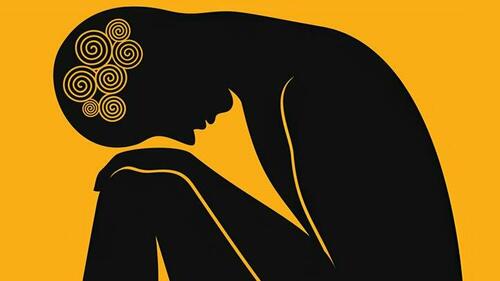Most Adults Should Be Screened For Anxiety, Depression According To US-Funded Panel
A panel of experts operating under the Department of Health and Human Services has recommended that all adults under the age of 65 should be screened for anxiety disorders, and all adults regardless of age should be checked for depression amid an uptick in American reporting mental-health issues following the Covid-19 pandemic.
The guidance, released Tuesday, marks the first such recommendation regarding adult anxiety disorders from the US Preventative Services Task Force, which issued similar draft guidance several months ago for children and adolescents, the Wall Street Journal reports.
"This is a really important step forward," said American Psychological Association CEO Arthur C. Evans. "Screening for mental-health conditions is critical to our ability to help people at the earliest possible moment."
The task force said that there wasn’t enough evidence on whether or not screening all adults without signs or symptoms ultimately helps prevent suicide. The group didn’t recommend for or against screening for suicide risk, but called for more research in the area.
The task force, a panel of 16 independent volunteer experts, issues guidance on preventive-care measures. Health insurers are often required to cover services recommended by the task force under a provision in the Affordable Care Act. -WSJ
According to estimates from the federal Household Pulse Survey, over 30% of adults reported having symptoms of anxiety disorder or depressive disorder this summer, while the CDC reports that the percentage of US adults who received mental-health treatment over the past year increased from 19% in 2019 to 22% in 2021.
Mental health issues are often caught during doctor's office screenings, where patients fill out questionnaires that can identify at-risk individuals who may not be showing obvious signs of a problem. The surveys ask about feelings of depression or hopelessness, trouble sleeping, eating, or thoughts of harming themselves, on a scale of 'not at all' to 'nearly every day.'
"It helps me get a better idea about whether their insomnia is really pure insomnia or if it is part of depressive symptoms," Dr. Riza Conroy, a primary-care physician at Ohio State University, told the Journal.
That said, widespread screening can also yield false-positives, leading to potential overdiagnosis and unnecessary treatment that may instead cause side effects, along with 'unease and stigma,' according to the task force and other mental-health experts.
"You could be flagging a lot of older adults for having an anxiety disorder when they don’t," said Dr. Lori Pbert, task-force member and professor in the department of population and quantitative health sciences at UMass Chan Medical School.
"You end up with a score that you feel you have to act on," said Stephanie Collier, a psychiatrist at McLean Hospital and a consulting psychiatrist for the Population Health Management Team at Newton-Wellesley Hospital in Massachusetts, who wasn’t involved with the new guidance.
To inform the new recommendations, task-force members reviewed evidence from some 173 studies that looked at screening-test accuracy and the effectiveness of available interventions for depression, anxiety disorders and suicide risk. A few studies looked at the direct impacts of the screening itself on health outcomes.
The task force concluded that screening all adults for depression, including those who are pregnant or postpartum as well as older adults, has a moderate net benefit, echoing its previous 2016 recommendations. The task force also recommended screening adults under 65, including pregnant and postpartum people, for anxiety but said that there wasn’t enough evidence to make the same recommendation for older adults. -WSJ
According to the report, the Task Force received some pushback in April over its lack of recommendation for suicide screening among adolescents.
"It could present a threat to forward progress in preventing suicide at a time when it’s clearly showing up as a national health crisis," said Christine Yu Moutier, chief medical officer at the American Foundation for Suicide Prevention.
According to task force member Gbenga Ogedegbe, healthcare providers should use their professional judgement for each patient to determine whether to screen for suicide risks.
https://ift.tt/RZY8KUi
from ZeroHedge News https://ift.tt/RZY8KUi
via IFTTT


0 comments
Post a Comment